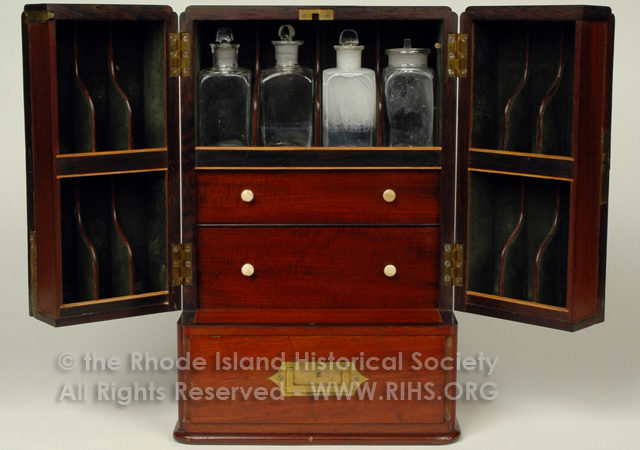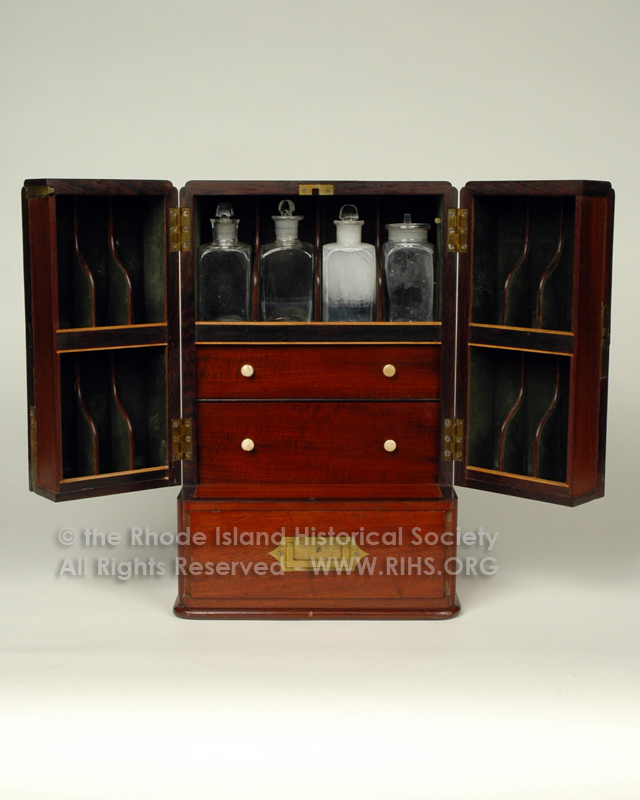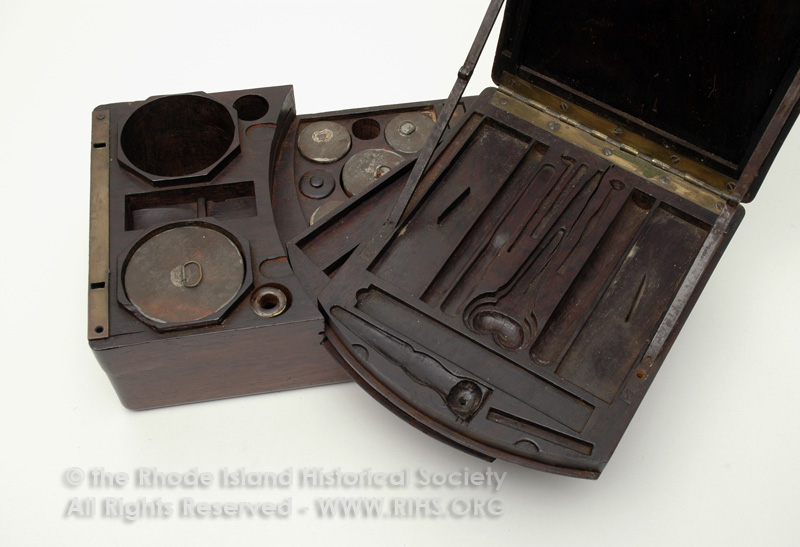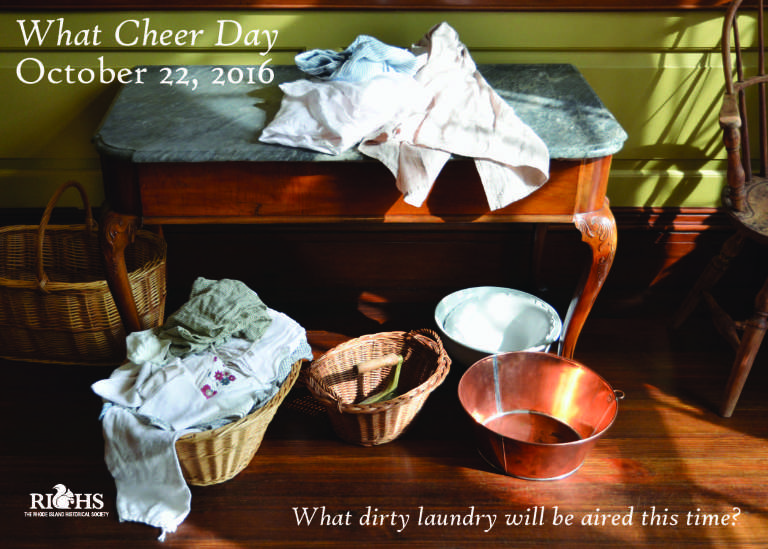
Dr. William Bowen was born in Providence, March 8, 1747.
His father, Dr. Ephraim Bowen, called him “Billie”. He is mentioned frequently in various family papers as being the physician who treated departed relatives in their last illnesses. For example, he was summoned when Nicholas Brown was on his death bed.

While this Medicine Chest was used on the privateer Yankee, it is from the same time period that William practiced (1750-1800) and he would have used something similar. Call #1954.9.1
In June of 1764, he and John Brown (1736-1803) were exposed to smallpox in Boston and stopping in Rehoboth on their return, they were “washed all over with rum” in order to reduce the “hazard of spreading Small Pox”. John sent a message ahead to Providence requesting a change of clothes and a bottle of rum for a second wash down for him and “Billey Bowen”.
The Bowen Family is mentioned in Representative Men and Old Families of Rhode Island, Volume II (CT 258 .R42 1908 c,2) with William on page 1011. It states he attended Harvard for “one or two years” and graduated from Yale in 1766. He studied medicine with his father and attended medical lectures at the Medical School in Philadelphia. He became a “very popular and respected physician”. He practiced for more than sixty years and seemed “fitted by nature for the profession he adopted; his very presence inspiring hope.” He combined a remarkable degree of “affability and dignity in his intercourse with others”. He was a “polished gentleman of the old school, of most affable and winning manners, in social life singularly easy and perfectly at home. His dress was a drab coat, vest, and shorts, with yellow topped boots; his hair combed back and sometimes powdered, and curled on the temples, with a queue behind. Possessing the characteristics which distinguished him, he was welcomed as a friend full of tenderness and sympathy in the families where he practiced.”
He avoided surgical practice, but in diseases of women and children he excelled; he was particularly skillful in the treatment of fevers. He frequently consulted with colleagues about patients and best treatment options. This letter, from fellow doctor John Morton of Philadelphia, discusses a patient of William’s and her confounding disorder.
MSS 301 Bowen Family Papers
William married Sarah Ann Corliss, daughter of Capt. George Corliss and his wife Waitstill Rhodes on December 6, 1769. In October of 1770, he became an original corporator of the Benevolent Congregational Society of Providence where he and Sarah attended services.
They lived at the corner of College & South Main Streets (now the location of the Superior Court House) where they raised 6 children: Elizabeth married in 1799 to Thomas Amory; Sarah married in 1816 to William Skinner; George Corliss 1774-1794; Maria (1782-1836) married in 1809 to John Whipple; William Corliss (1785-1815) married in 1812 to Rebecca Olney; Harriet (1791-1792). William also owned the land across from his lot (now Memorial Park/RISD Auditorium) as well as the land at the corner of College & Benefit Streets (now Providence Athenaeum).
William fought in the American Revolution and was very active during the yellow fever epidemic of 1797; in fact he contracted the disease himself and managed to survive it. He continued to practice medicine to within a short time previous to his death.
Sarah died on April 23, 1825 at the age of 77, William on January 19, 1832. They are buried in Swan Point Cemetery with many other members of the Bowen family.
William’s Parents & Siblings
William’s father was Dr. Ephraim Bowen. Ephraim (1716-1812) first married to Mary Fenner (1720-1744), daughter of Thomas Fenner & Mary Abbott, with whom he had three children: Jabez (1739-1815) m. Sarah Brown (1742-1800); Oliver (1742-1800) m. Polly Cooke; Mary (1744-1744) she was born on August 16, 1744, his wife Mary died on August 23, 1744.
Ephraim married, in 1746, Lydia Mawney ((1723-1801), daughter of Col. Peter Mawney and his first wife, Mary Tillinghast. Together, Lydia and Ephraim had 11 children: William (1747-1832); Mary (1748-1834); Sarah/Sally (1750-1782) m. Thomas Lloyd Halsey; Lydia (1752-) m. John Innes Clarke; Ephraim Jr. (1753-1841) m. Sally Angell, she d. 1788 and in 1794 he m. Sarah Whipple; Benjamin (1755-1759); Dr. Pardon (1757-1826) m. Elizabeth Ward; Benjamin (1759-) m. Hannah Fenner; Nancy/Ann (1762-) m. Edward Mitchel; Betsey/Eliza (1765-) m. John Ward; Fanny/Frances (1768-) m. John Elias Moore.
Dr. Jabez Bowen, William’s half-brother, married Sarah Brown, daughter of Obadiah Brown & Mary Harris. Sarah was first cousin to the “Four Brown Brothers” of Providence. Jabez was deeply involved with the Browns in the shipping business involving slaves, molasses, rum & the China trade. He was Lt. Gov. of Rhode Island and hosted George Washington & Lafayette when the visited Providence. The Declaration of Independence was read for the balcony of his home in Market Square. His first son, Obadiah died when his ship wrecked off Dunkirk in July of 1793, he was 31 years old.
Ephraim Bowen, Jr, William’s brother, participated in the Burning of the Gaspee with John Brown and their cousin Dr. John Mawney. He married Sally Angell and had 6 children. Sally died in 1788 and in 1794 he married Sarah Whipple.

This Surgeon’s Box (1700-1800) descended from the Mawney Family and gifted to the R.I.H.S. in 1939. Perhaps it was carried by Dr. John Mawney when he boarded the Gaspee…Call #1939.4.1
Benjamin Bowen, William’s brother, married Hannah Fenner and settled in Herkimer County, N.Y. on land he bought with William & Ephraim. In 1793, Benjamin built the first saw-mill there and the following year, the first grist-mill.
You can meet Dr. William Bowen, aka “Billie” this Saturday, Oct. 22nd during What Cheer Day at the John Brown House as he attends to Alice Brown and her mysterious ailment…

What Cheer Day Returns With Focus on 18th-Century Fashion, Scandal

